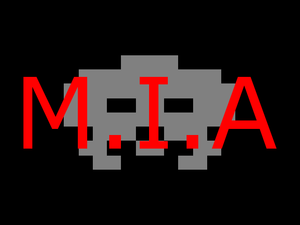Lost In Translation/Gokujyou Parodius! - Kako no Eikou wo Motomete
| Gokujyou Parodius! Kako no Eikou wo Motomete | |
|---|---|
| Manufacturer | Konami |
| Released | 1994 |
| Control Method |
8-way Joystick 3 Button(s) |
| Main CPU | 68EC020 (@ 24.000 MHz) 68000 (@ 9.200 MHz) |
| Sound CPU | Stereo (2x) K054539 (@ 48.000 kHz) |
| Video Details |
Raster (Horizontal) 288 x 224 pixels 60.00 Hz 8,192 Palette colours |
| Screens | 1 |
| ROM Info | 12 ROMs 13,500,416 bytes (12.88 MiB) |
| MAME ID | gokuparo · fantjour |
About The Game
Gokujyou Parodius! - Kako no Eikou wo Motomete is an arcade video game.
Second arcade sequel to 1990's "Parodius Da!", this parody of Konami's "Gradius" series picks up where the first game left off. This time, it isn't only their own games that the Konami shoot-em-up mocks; other classics of the genre such as Irem's legendary "R-Type" - specifically the infamous mothership that forms R-Type's entire third level - are lovingly parodied.
Trivia
The title of this game translates from Japanese as 'Fantastic Parodius! - Surpassing Its Former Glory'.
This game is known outside Japan as "Fantastic Journey".
The name of the fish character Mambo has a double meaning, he gets his name from the real life fish called Ocean Sunfish (or Mola Mola), but called Mambou in Japan. The other meaning is Mambo from the musical style, which is why the female partner character in this game is called Samba, yet another musical style.
Stage 1 music is a remix of 'In the Mood', by Joe Garland (1939).
Stage 1 boss music is a remix of 'Carmen : Le Toreador', by Georges Bizet (1875).
Stage 2 music is a remix of 'Stars and Stripes Forever', by John Philip Sousa (1896).
Stage 3 music is a remix of 'Tritsch-Tratsch Polka', by Johann Strauss (1858).
Stage 3 boss music is a remix of 'Mambo No. 5', by Damaso Perez Prado (1949).
Stage 4 music is a remix of 'Guillaume Tell', by Gioacchino Rossini (1829).
Stage 4 boss music is a remix of "Gradius"'s Aircraft Carrier music.
Stage 5 music is a megamix of 'Yankee Doodle', 'Ej lúčka, lúčka' / Czech Folk Song, 'Mary Had a Little Lamb', 'Circus Song' (Chopsticks), 'London Bridge', 'Picnic'.
Stage 5 boss music is a remix of 'Piano Sonata K.331, 3rd : Rondo Alla Turca', by Wolfgang Amadeus Mozart.
Stage 6 music is a remix of 'Juugoya Otsukisan', by Nagayo Motoori.
Stage 6 boss music is a remix of 'Zuizui Zukkorobashi', by Japanese Children's Song.
Moai Ship stage music is a remix of 'Die Walküre', by Richard Wagner.
Moai Ship stage boss music is a remix of 'Symphony No.25 in G minor, K.183; 1st movement', by Wolfgang Amadeus Mozart.
Stage 7 music is a remix of 'Symphony No.9 in E minor : From The New World', by Antonin Dvorak.
Special stage music is a megamix of music from others Konami Games : "Twin Bee", "Salamander", "Ajax", "Gradius II", "Gradius III", "Thunder Cross".
Special stage boss music is a remix of 'Flight of the Bumblebee', by Nikolai Rimsky-Korsakov.
Ranking table music is a remix of 'The Nutcracker Suite, Op. 71a', by Peter Ilyich Tchaikovsky.
Soundtrack releases :
Gokujou Parodius [King Records - KICA-7641 - Jul 5, 1994]
Series
- Parodius - Tako wa Chikyuu o Sukuu (1988, MSX)
- Parodius Da! - Shinwa kara Owarai e (1990)
- Gokujyou Parodius! - Kako no Eikou wo Motomete (1994)
- Jikkyou Oshaberi Parodius (1995, Nintendo Super Famicom)
- Sexy Parodius (1996)
Staff
- Programmers
- Chichibinta Tsukasa
- V. Mailer
- Character Designers
- Shuzilow.Ha
- Magurou
- Taro Maru
- Ishimaroid
- Bon.Natsumi
- Music
- Prophet Fukami
- M.Puddin' Satoko
- Sitar Senoo
- Sound Effects
- Gokujyou-Tasaka
- 118
- Hard Designers
- Million Hide
- Suke
- Escape Yoshiaki
- Nanba Shot Tom
- Product Designer
- Poper Takashi
Cabinet and Artwork
Ports
- Consoles
- Nintendo Super Famicom (1994)
- Sony PlayStation (1994, "Parodius Deluxe Pack")
- Sega Saturn (1995, "Parodius Deluxe")
- Sony PSP (2007, "Parodius Portable")


